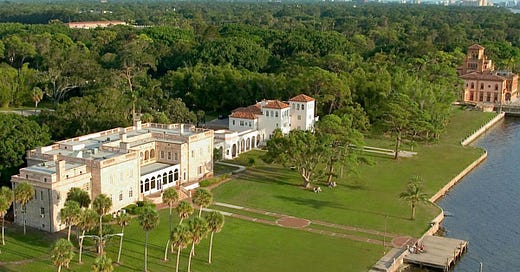"Un-Woking" a University
DeSantis wants to make New College of Florida the Hillsdale of the South
Last week, Florida Governor Ron DeSantis continued his culture warring by appointing six new board members to the New College of Florida. The majority of the new appointees represent the most conservative “anti-woke” advocates around. Chris Rufo is the guy who said that he wanted the meaning of Critical Race Theory to be so fuzzy that it allowed any critique without requiring specificity. Charles Kessler and Matthew Spalding served on Former President Trump’s 1776 Project (a reactionary response to the 1619 Project). The others have their own stories.
According to Inside Higher Ed, the NCF board has a total of 13 board members including a faculty and student representative. With this appointment, DeSantis’ conservative block will make up a majority of the external board members.
New College is something of an anomaly in state systems of higher education. It has only 700 students1 and maintains a strong liberal arts focus.2 This is likely what makes it a target for Un-Wokening.
I didn’t know anything about NCF until a few years ago. A book group I was in read Eli Saslow’s Rising Out of Hatred. It tells the story of Derek Black, son of Don Black who created the White Nationalist website Stormfront. For years, Derek joined his father on their radio show. After earning his community college degree, Derek transfered to NCF. Saslow’s book documents how the experience of studying at NCF, what he was reading, and friendships he formed (especially with Jewish students) caused him to renounce his prior views. He has gone on to work on a PhD in History and remains active in denouncing white supremicism.
I don’t know where this story would land with the DeSantis-Rufo crowd. If this is what woke means, I say we need more of it!
Yet, the governor and the new board members are eager to make changes. In an opinion piece in the New York Times, Michelle Goldberg captured some of Rufo’s plans:
Later this month, Rufo said, he’ll travel to New College with a “landing team” of board members, lawyers, consultants and political allies. “We’re going to be conducting a top-down restructuring,” he said, with plans to “design a new core curriculum from scratch” and “encode it in a new academic master plan.” Given that Hillsdale, the template for this reimagined New College, worked closely with the Trump administration to create a “patriotic education” curriculum, this master plan will likely be heavy on American triumphalism. Rufo hopes to move fast, saying that the school’s academic departments “are going to look very different in the next 120 days.”
As I’ve written before, I have served as an accreditation reviewer for over two decades. While I’ve never been involved in the Southern Association of Schools and Colleges, their accreditation guidelines read much like those I know better. Beside, Florida has recently made noises about trying to apply to the Higher Learning Commission (where I now serve).
As I looked through the SASOC guidelines, I found the kinds of things I’ve come to expect. For example, they are clear that the board
ensures a clear and appropriate distinction between the policymaking function of the board and the responsibility of the administration and faculty to administer and implement policy.
In terms of curriculum, the guidelines are crystal clear:
The institution (a) publishes and implements policies on the authority of faculty in academic and governance matters, (b) demonstrates that educational programs for which academic credit is awarded are approved consistent with institutional policy, and (c) places primary responsibility for the content, quality, and effectiveness of the curriculum with its faculty.
It’s quite unlikely that the new board members will be remaking the institution in the next 120 days. Goldberg quotes the UCF faculty union president:
People like Rufo “are making statements to make impact,” Shipman said. “And I really don’t know how viable some of those statements are on the ground.”
This morning, the Washington Post’s Greg Sargent had an excellent piece contrasting President Biden’s trip the border with Ron DeSantis’s Martha’s Vineyard stunt. In short, he argues that the brazenness of the right wing stunts draw media attention precisely because of that brazenness. They aren’t interested in addressing immigration issues when they can control the narrative.
It’s quite likely that we’ll find a similar thing happening with the New College of Florida stunt. The press (and those in the public who pay attention to higher education) say, “that’s outrageous!”. Which was the end goal all along.
We’ll see what comes to pass with the remaking of NCF. My personal take is that changing an institutional culture is immensely difficult even with lots of time. To force change on a school of 700 in a matter of months is to put enrollment at risk in a very precarious time in higher education.
But then if NCF falls into financial difficulty, the anti-woke folks can blame its liberalism. Which is all this was about anyway.
By comparison: U of Florida has 60,000 students, FSU has 35,000, Central Florida has 66,000, and U South Florida has 50,000.
Which makes it a strange place to force a Classics approach.





John, thank you so much for this. I went to USF for two degrees and knew people at New College. This was some time ago, but New College was innovative and also very tolerant of a variety of views. The students there were sharp folks. It still seems to be a unique place. I agree that this is likely just another stunt. Whether they alter New College much or not, they'll get loads of press coverage, and, as you say, that's the goal. I also agree they can't turn New College upside down and drastically alter the core in 120 days--that timeline is absurd. Thanks again! Have a blessed day.